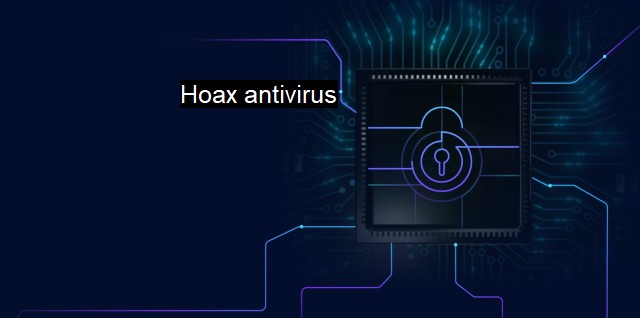What are Hoax antivirus?
Defending Against Hoax Antivirus Attacks: A Growing Cybersecurity Threat Targeting Unsuspecting Users
Hoax antivirus, also known as rogue security software or scareware, is a form of malicious software that deceives users into believing their system is compromised and encourages them to install fake antivirus software. The purpose of this fake software is to scam the user out of money while doing nothing to protect their system. In fact, it commonly poses a real threat to system security due to its potentially devastating capabilities.Given that cybersecurity and antivirus protection play an integral role in the protection of computers from malware, a hoax antivirus operates essentially as an obstacle to effective cybersecurity by presenting itself as a solution to what is actually a non-existent problem. When a user installs hoax antivirus software, what they are essentially doing is sacrificing their security environment. This is often accomplished through manipulative psychological threats, such as claims of multiple viruses on the user's computer or other scary alerts designed to panic users into taking quick, thoughtless action.
Often, the apparent consequences of not responding to the hoax antivirus messages are detrimental enough that users feel pressured to pay for the fake solution. In this manner, not only does the user unwittingly provide cybercriminals financial gain, but they also potentially expose their own personal and financial information, thereby increasing their vulnerability to further malware attacks.
One of the ways hoax antivirus gets access to a system is through misleading email links or compromised websites that trick users into believing they’re downloading legitimate software. Often, users targeted by these attacks lack sophisticated understanding of how cybersecurity threats operate; as such, they mistake these sneak attacks as genuine threats from their legitimate security software.
Hoax antivirus can appear as pop-ups or software that repeatedly sends alerts even though no problems exist. It also operates by destabilizing other legitimate antivirus software in the system causing more damage than initially apparent. Sometimes, the fake antivirus might even act like it is scanning the system and threatening the user with horrific outcomes if it is not downloaded promptly.
Another way to understand hoax antivirus is by considering it not just as a problem but also as a symptom of broader issues within the cybersecurity and antivirus landscape. It reveals weaknesses in the public’s cybersecurity practices and points to a need for increased education about such issues. For one, it showcases the need for people to have an understanding of how professional antivirus software looks and operates to recognize false threats better.
Also, users need to often update their systems, enhancing their in-built security mechanisms and enabling them a chance to regularly check for legitimate updates. individuals using digital platforms need to develop the capability to question alerts and requests from unknown sources, increasing their overall resilience to unwarranted threats.
Given the scale of impact that hoax antivirus can have on individual systems and the wider digital environment, dealing with this issue forms a significant component of larger cybersecurity strategies. Experts continuously innovate ways to spot and eradicate such practices, and users are encouraged to maintain regular backups interrupted by any cybersecurity threat, hoax or legitimate.
Hoax antivirus is a growing menace and concerted efforts are required from both users and security providers to combat it effectively. Businesses and individuals alike must cultivate cybersecurity awareness and sound practices, helping each other navigate an ever-evolving digital landscape fraught with increasingly sophisticated threats. navigating the digital environment with caution, expertise and skepticism towards unsubstantiated alerts from unverified sources can go a long way in successfully battling hoax antivirus.

Hoax antivirus FAQs
What is a hoax antivirus?
A hoax antivirus is a type of malicious software designed to trick users into believing their computer is infected with viruses and convince them to pay for a fake antivirus program.How does a hoax antivirus work?
Typically, a hoax antivirus will display fake virus alerts and scare the user into believing that their computer is infected with a virus. Then, the program will offer to clean the computer of the fake viruses for a fee, and may even attempt to steal personal and financial information from the user.How can I avoid falling victim to a hoax antivirus?
To avoid falling victim to a hoax antivirus, be wary of emails or pop-ups claiming that your computer is infected with a virus. Only install antivirus software from reputable companies and make sure you keep it updated. Be cautious of any unsolicited offers to fix your computer and never provide personal or financial information to unknown or untrusted sources.What should I do if I have already fallen victim to a hoax antivirus?
If you have already fallen victim to a hoax antivirus, immediately stop all online activity and disconnect from the internet. Scan your computer with a reputable antivirus program and remove any suspicious software or files. If you provided any personal or financial information, contact your bank or credit card company and report the incident as fraud.| | A | | | B | | | C | | | D | | | E | | | F | | | G | | | H | | | I | | | J | | | K | | | L | | | M | |
| | N | | | O | | | P | | | Q | | | R | | | S | | | T | | | U | | | V | | | W | | | X | | | Y | | | Z | |
| | 1 | | | 2 | | | 3 | | | 4 | | | 7 | | | 8 | | |||||||